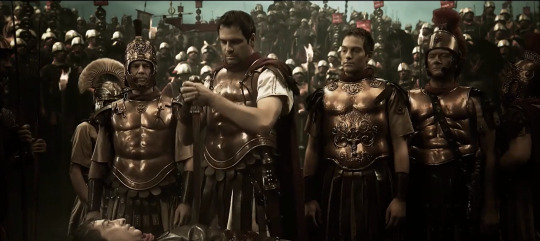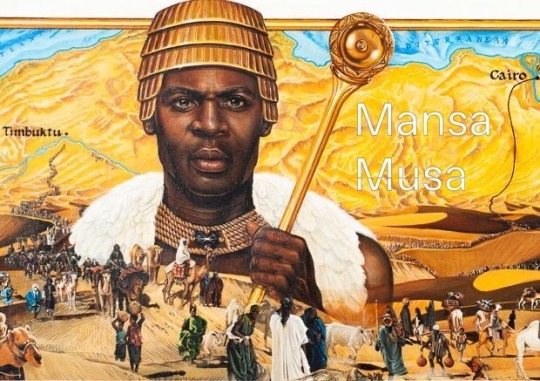#all hail (the death of) julius caesar
Text

image credit: https://www.pinterest.com/pin/218424650665429037/
#the ides of march#stab everyone and laugh#all hail (the death of) julius caesar#it's the fifteenth how could i not?#it's practically obligatory#so let us all come together to stab annoying politicians
5 notes
·
View notes
Text
SECOND BATTLE OF PHILIPPI, 23 RD OCT, 42 BC
Following the first battle both sides returned to their original camps to re-group. Brutus, taking over Cassius' camp, sought to stick to his original plan of holding station until the enemy was forced to withdraw through lack of provisions. Brutus did harass the enemy via night attacks on their position and even diverting a river to wash away part of their camp. Lacking supplies and having lost their back-up in the Adriatic, Antony and Octavian had to make their move before winter really set in and forced them to leave the field. Initially, Brutus stoically resisted the repeated taunting by the enemy to come out and face them but eventually, at least according to the ancient Roman historians, ill-discipline got the upper hand and Brutus' army took their own initiative and descended to the plain.

Antony had, meanwhile, also made some daring and decisive moves. First, he took full advantage of a small mound south of Brutus' camp which the Republican leader had left unguarded (and this despite the fact that Cassius had previously stationed a garrison on it). Building a palisade of whicker, four legions were now dangerously close to Brutus' position. At the same time Antony moved ten legions into the central marsh area and two more a little further east. Brutus responded by building a fortified camp facing each of these two blocks of enemy troops but if the battle lines were extended any further then Brutus would be isolated from his supplies and backed up against the mountains -an impossible position to defend. The Republican army, then, had little choice but to engage the enemy with a full-scale assault. The time for dilly-dallying was over.

The use of artillery weapons in the confines of such a tightly-packed battlefield was considered impractical and the opposing armies immediately clashed in fearsome hand-to-hand fighting. Initially, the Republicans did well against the enemy's left wing but Brutus, with fewer troops at his disposal, had stretched his lines thin to ward of an out-flanking manoeuvre. The consequence was Antony relentlessly pushed forward and smashed the enemy centre and, moving left, attacked the rear of Brutus' lines. The order of the Republican troops now completely broke down and chaos ensued. Meanwhile, Octavian had attacked the Republican camp while Antony used his cavalry to chase down Brutus and prevent his escape. The Republican leader had found refuge in the nearby mountains but when his four remaining legions moved to plea for clemency from Antony, Brutus took his own life. In total 14,000 soldiers surrendered and while some others managed to flee by ship to Thasos, the Republican cause was at an end and Julius Caesar's murder had been avenged. In the words of Ovid, "all the daring criminals who in defiance of the gods, defiled the high priest's head [Caesar], have fallen in merited death. Philippi is witness, and those whose scattered bones whiten its earth".
Whilst Antony was hailed as imperator by the victors and losers alike, Octavian, who had dealt more harshly with the defeated, was not so highly esteemed. As Plutarch stated in no uncertain terms, "[Octavian] did nothing worth relating, and all the success and victory were Antony's". The legions were again re-distributed with Antony taking eight to campaign against Parthia whilst Octavian, with three, returned to Italy. The battle, with its 40,000 fatalities and subsequent retaliations against Republican sympathizers, robbed Rome of some of its finest citizens and soldiers, and still the question of just who would rule Rome was not settled.
Sources: Si Sheppard, Philippi 42 BC.
Arthur Weigall, The Life & Times of Marc Antony
#mark antony#marc antony#marcus antonius#battle of philippi#octavian#caesar augustus#second triumvirate#marcus brutus#marcus junius brutus#julius caesar#gaius julius caesar#ancient rome#roman history#roman republic#roman empire#rome#history#otd#this day in history#pawel delag
18 notes
·
View notes
Text
sans Danganronpa
read it on the AO3 at https://ift.tt/HEtCpFx
by LooseGazpacho
The Winner of the Tumblr Sexyman twitter competition 2022 has now entered a Killing Game? What will the man, the myth, the legend do in such situation?
Words: 10036, Chapters: 1/1, Language: English
Series: Part 1 of Prologue: Introduction Pain
Fandoms: Dangan Ronpa - All Media Types, Undertale (Video Game), Better Call Saul (TV), Persona 5, Persona 3, Scooby Doo - All Media Types, Despicable Me (Movies), ひとりぼっち��まるまる生活 | Hitori Bocchi No Marumaru Seikatsu (Anime), SpongeBob SquarePants (Cartoon), All Hail King Julien, Zero Escape (Video Games), Doki Doki Literature Club! (Visual Novel), Borat: Cultural Learnings of America for Make Benefit Glorious Nation of Kazakhstan (2006), Cuphead (Video Game)
Rating: Teen And Up Audiences
Warnings: Major Character Death
Characters: Sans (Undertale), Sakamoto Ryuji, Howard Hamlin, Kirigiri Kyouko, Felonius Gru, Hitori Bocchi, Sandy Cheeks, Clover (All Hail King Julien), Kurashiki Akane | June, Gaius Julius Caesar Octavianus | Emperor Augustus, Norville "Shaggy" Rogers, Monokuma (Dangan Ronpa), Natsuki (Doki Doki Literature Club!), Yamagishi Fuuka, Borat Sagdiyev, Mugman (Cuphead)
read it on the AO3 at https://ift.tt/HEtCpFx
0 notes
Text
“...It stands to reason that a society which is ruled by its male senior citizens through the control of younger and less powerful men would instill reverence for the wisdom of advancing age in its male youth. The Romans, we might observe, referred to previous generations as maiores, greater individuals, and employed the adjective magnus, great, in the kinship terms for parents' close male and female ascendants (a practice the English language has adopted with its use of the adjective "great" for kin of earlier generations); such a practice testifies to the Roman equation of seniority with superiority, and to the inclusion of women among its superior seniors.
Thus it should come as no surprise that older women seem to command more respect, inspire more awe, and have (or be perceived as having) greater social and political influence than do younger ones. In addition, Roman women along in years were more likely to have young male relatives who were eager to prove themselves worthy of and to their elders, and who were mindful of the nurturance they had recently received from mothers and older kinswomen; such young men were under special pressure to manifest their respect and awe for their female maiores through publicly visible gestures.
We have already examined the idealization in Tacitus' Dialogus of the moral instruction and intellectual sustenance provided for an eternally indebted Roman male youth committed to a life of public service by his upstanding female relatives; this picture is far from unique in Roman writings. Such a vision of an older Roman matron's function, and of Roman mother-son relations, seems the parodic point of Plautus' Casina. The play, composed immediately before the playwright's death in 184 B.C., was popular enough to be revived in the next generation. In it, the materfamilias Cleostrata intimidates her elderly and socially powerful husband both through proving herself his moral superior and, as her son's ally and abettor, by ingeniously securing for this son the sexual favors of a slave girl his father also covets.
By cleverly rendering her presumably grateful son such services, attracting admiration for her capable handling of this complex affair, but nonetheless setting herself up as a moral example in the process, she evidently travesties the Roman concept of a wise, righteous, and exemplary mother. This same vision, however, is reproduced as part of a serious moral and political exemplum in Livy's narrative on the Bacchanalian scandal, an episode which profoundly shook Roman society shortly before the Casina was first performed. Livy's young male protagonist Aebutius and his reluctantly influential courtesan mistress Hispala Fecinia manage to bring the matter to the consul Postumius' attention, and Postumius proceeds to bring the malefactors to justice, solely through the aid of Aebutia, amita (father's sister), to Aebutius, and Postumius' venerable mother-in-law Sulpicia.
These two older women—depicted as virtuous, beneficent, sagacious, deserving of male reverence and hence, by Livy's implication, truly "maternal"—are contrasted with two, far less admirable, matronly counterparts: Aebutius' own mother Duronia, whose devotion to both her second husband and his interest in depriving Aebutius of his patrimony led her to seek her son's undoing by having him initiated into Bacchic worship; the Campanian priestess Paculla Annia, who began the Bacchic cult's corrupting influence by initiating its first men, her own sons.
Livy's account, at 39.nff., of Postumius' efforts to ascertain, through Sulpicia, the character of Aebutia, warrants special notice since here he treats these two nurturant and publicly influential mother figures in a sympathetic and sentimentalizing fashion: he refers to the former woman as dignified, a gravis (and later a gravissima) femina, to the latter as morally upright and of old-fashioned ways, probam et antiqui moris; he even describes Aebutia as moved to tears by, the dreadful treatment of her brother's son (filius eius fiatris), also morally upright (probus), by those who should have been the last to do so.
Another, doubtlessly romanticized, moralizing tale also attests to both the esteem in which a young Roman male was to hold his elder kinswomen's judgment and moral authority and to the public display and political impact of such esteem, namely the story of Gnaeus Marcius Coriolanus. Set in the mid-fifth century B.C., the story achieved great popularity in the classical period: a lost book by Cicero's closest friend Titus Pomponius Atticus featured Coriolanus prominently; Livy, Valerius Maximus, and Plutarch all treat his tragedy. Coriolanus has recently been called the "Roman archetype" of the "perpetual mama's boy" in a provocative psychoanalytic study of the Roman mother-son relationship, and for good reason: he allegedly valued his widowed mother so highly that he abandoned a traitorous march on Rome at the head of an enemy force only after she demanded that he desist.
There are less dramatic, and probably somewhat more reliable, pieces of ancient Roman testimony to the reverential regard of young Roman men for the older, maternal female members of their families, to their—and others'—experience of these women as significant and influential individuals, and to the frequent exhibition of both this regard and this experience in a larger sociopolitical context. Several laudationes Junebres, orations delivered by aristocratic Roman men (and usually youthful ones) to honor a deceased relative of political distinction, belong in this category.
Cicero reports that the first such speech in commemoration of a woman was given in 102 B.C. by the consul Quintus Lutatius Catulus to honor his mother Popilia; no young woman received this same recognition until over thirty years later, when Julius Caesar's second wife, Cornelia, was buried amid her husband's public praises. That same year, however, Caesar made a more memorable, or at least better remembered, contribution to funeral oratory with his laudation of his father's sister Julia, wife of the military and political leader Marius. Caesar's words first proclaimed the glory of this aunt's, and hence his own father's, maternal ancestry: The maternal lineage of my paternal aunt Julia descended from kings, the paternal is connected with the immortal gods.
For the Marcii Reges go back to Ancus Marcius, Marcia being the name of her mother, and the Julii, to which clan our family belongs, are offspring of Venus. There is, therefore, in her lineage both the holiness of kings, who have the greatest power among humans, and the religious quality of gods, in whose power are the kings themselves. Perhaps not insignificantly, Ancus Marcius, the early king from whom Julia's maternal Marcii traced their lineage, supposedly inherited Rome's throne through his maternal grandfather; so, too, the divinity from whom her (and her nephew's) paternal Julii avowed their descent was Venus, mother of the Trojan hero Aeneas.
A later, and also elderly, Julia, Caesar's sister, was hailed in the funeral laudatio upon her death in 51 B.C. by the twelve-year-old Octavius, whose mother Atia was Julia's daughter; through this maternal grandmother Octavius, later the emperor Augustus, could claim descent by blood, as well as adoption, from Venus and the Julian clan. The laudatio delivered in 42 B.C. to honor the nonagenarian Caecilia by her son Atticus, a man whose attraction to the Coriolanus legend we have already noted, stirred comment as providing proof of Atticus' familial devotion (pietas): said to be sixty-seven at the time, he pointed out that he had never once needed to apologize to his mother, nor quarreled with his sister, who was almost the same age as he.
One might also consider in this context an inscription generally dated to the early empire, the laudatio of a noble matron Murdia. It is dedicated by a son of the woman's first marriage, despite the fact that her second husband seems to have been numbered among her survivors. She is, moreover, identified only with the words Murdiae L(ucii) F(iliae) Matris, "Murdia, Lucius' daughter and my mother"; she is acclaimed by this son as "most precious to me" (carissima mihi), although he says nothing about affection between her and either husband.
Along with citing her modesty (modestia), upright character (probitas, an attribute we have seen noted in Livy's Aebutia and Aebutius), chastity (pudicitia), compliant nature (opsequium), wool-spinning (lanificium), conscientiousness, and trustworthiness (diligentia and fides), he cites her wisdom (.sapientia); what is more, he accords her special praise for treating all of her sons equally in her will. Both mater and amita also figure prominently in another, fairly early and important source for the public reverence awarded and sociopolitical significance clearly and justifiably ascribed to older Roman women of the upper classes by their younger male relatives.
…It may help further to elucidate why other young Roman men of the upper classes regarded their elder female relations, their own and other men's mothers, so seriously, looking upon them as socially and politically powerful figures deserving publicly visible homage. Atticus' sister of sixty-odd, Aemilia, the dowager sister of Lucius Aemilius Paullus, and the matrons who were sisters of Aemilia's son Publius Cornelius Scipio (and hence enjoyed the magnanimity of his adoptive son) obviously rank among older women, whether by age or by relation to their devoted male kin. But the concern publicly evinced for other, younger, women of high birth by their brothers, such as that displayed by Scipio in his munificence to his sisters, indicates that sisters in Roman elite society were also highly, and publicly, esteemed by their brothers.
Evidence from Roman comedy merits special note in this context. A lengthy passage from Plautus' Aulularia generalizes on the feelings and duties of brothers and sisters to one another: it depicts Roman brothers and sisters as partaking of a close relationship, sharing the same concerns, and looking to one another for advice; it depicts one particular sister, moreover, as expecting her advice to be followed. At lines i2off. Eunomia speaks of her sincere commitment to her brother Megadorus' best interests as "befitting a sister of the same parents" While acknowledging that brothers find sisters bothersome, she points out their mutual obligation to counsel and admonish one another, and even demands that Megadorus do what she orders; she justifies these demands on the grounds that she is closest to him and he to her.
More importantly, both Roman legend and Roman historical writing concur in their depiction of this fraternal esteem for sisters, and fraternal compliance with sisters' wishes, as having a substantial public impact among the Roman elite. They suggest that a Roman sister, though likely to be regarded with respect rather than veneration, and subtly complimented rather than eulogized, by her brother, often exerted influence of a political nature both on and through him; they indicate that various sisters publicly reflected in—and often actually benefited from—their brothers' social and political prestige.”
- Judith P. Hallett, “Women of Elite Families and Roman Society.” in Fathers and Daughters in Roman Society: Women and the Elite Family
9 notes
·
View notes
Text
THE ARCH OF GERMANICUS AT SAINTES



The Arch of Germanicus was built by Caius Julius Rufus, a wealthy citizen of Mediolanum Santonum (Saintes) in AD 19. The inscription beneath the cornice states that the arch was dedicated to Germanicus, the adopted son of Tiberius:
GERMANICO [CAESA]R[I] TI(berii) AUG(usti) F(ilio)
DIVI AUG(usti) NEP(oti) DIVI IULI PRONEP(oti)
[AUGU]RI FLAM(ini) AUGUST(ali) CO(n)S(uli) II IMP(eratori) II
[To Germanicus Caesar, son of Tiberius Augustus, grandson of the deified Augustus, great-grandson of the deified Julius, augur, flamen, augustales, consul for the second time, hailed imperator for the second time.]
The arch commemorates the death of Germanicus in AD 19, but inscription’s disproportionately long reference to Tiberius indicates that the monument was tacitly addressed to the emperor.
The donor is fully identified by an inscription that carved on all four sides of the arch:
C(aius) IVLI[us] C(aii) IVLI(i) OTUANEUNI F(ilius) RVFVS C(aii) IVLI(i) GEDOMONIS NEPOS, EPOTSOVIRIDI PRON(epos)
[SACERDOS ROMAE ET AUG]USTI [AD A]RAM QU[A]E EST AD CONFLUENT[E]M, PRAEFECTUS [FAB]RUM, D(at).
[Caius Julius Rufus, son of Caius Julius Otuaneunus, grandson of Caius Julius Gedemo, great-grandson of Epotsovirid(i)us, priest of Rome and of Augustus at the altar at Confluens, prefect of works, gave this.]
The arch originally stood over the road running from Lyon to Saintes. To allow for the expansion of the river quays in 1843, it was was disassembled and relocated 15 meters closer to the entrance to the city.
20 notes
·
View notes
Text
VAA: 154 The Roman Virus
Containment: sealed inside safe sealed with 4 code locks of 15 numbers
Item:a box containing 2 vials, one containing the blood of former Roman emperors the other containing the blood of Romulus, the mythical founder of Rome, and a note written in latin that transcribed says 'for the new age of Rome to dawn the blood of the first must be one with those that led beyond him'.
Aquirement: so basically we got some juicy info that the last Roman Emperor was burried with a box the Roman Cult really wanna get their hands on which meant it was important we don't let them so after a fuck load of my ass in fuckin European fields since im the unlucky asswipe they go to for historic shit like this we found good ol Romulus Augustus' boney body and along with it the box. I took care of the box and we took his coffin away via heli but bad news bears the Roman Cult and, I cant belive I can say this and not be joking even in this job, Julius fucking Caesar found us or as his men call him 'Imperator Caesar' and we had to run the fuck away because a cult with the goal of reviving Rome getting their hands on the box that contained the key to their goals sounded like as much a good idea as giving a blowjob to a very sensitive shotgun so yeah we ran like hell with a hail of gunfire and fuckin lightning coming our way and after a few days of trying to lose them they lost us in Berlin which in some way is fucking hilarious but the fact my nerdy ass managed to out run fucking Roman Super soldiers is way more funny if im honest.
Properties: alright now the fun bit of why the fuck is two bottles of old asshole blood so important. Basically if you combine the two the blood turns into a gas entering any potential hosts. whats it do then? Well fucking wait a moment im getting to it, it basically sees if you have the right genes for Rome and if you do you have 3 days of shit starting with speaking latin accidentally and day 3 is total agony as your DNA gets ripped apart to get rid of Germanic or non European genes and Roman genes get made to fill in all those gaps.
History: now then the big question of how the fuck this thing exists, luckily Augustus got burried with his journal or whatever Romans called scrolls detailing important moments in their lives and Rommies pop pop really wanted Western Rome back to not being a shadow of a shadow of its former self so he did some ritual or whatever and made the vials then gave em to his kid who tried to use it but since Rome was just full of Germans fuck all happened so his dreams ended and he had the box burried with him in an unmarked grave after he was exiled from Rome.
Notes:
1) Roman cult could be a problem in future so we need to figure out how to deal with em or limit them somehow.
2)Romulus Augustus' body was less decayed more like he starved to death, anomalous properties may be at play.
3) I better get a fucking pay raise for all the bullshit I had to do to get the box.
2 notes
·
View notes
Photo

The historian Mostafa Abdel Hamid el-Abbadi in his personal library in Alexandria, Egypt, in 2012. He developed plans to revive the ancient Great Library of Alexandria.
Professor Abbadi’s dream of a new library — a modern version of the magnificent center of learning of ancient times — could be traced to 1972, when, as a scholar at the University of Alexandria, he concluded a lecture with an impassioned challenge.
It was President Richard M. Nixon who blew wind into the sails of Professor Abbadi’s ambitious proposal. When Nixon visited Egypt in 1974, he and President Anwar el-Sadat rode by train to Alexandria’s ancient ruins to observe their faded grandeur. When Nixon asked about the ancient library’s location and history, no one in the Egyptian entourage had an answer.
In 1988, President Hosni Mubarak laid the foundation stone for what would become the Bibliotheca Alexandrina, a $220 million seaside cylindrical complex. Designed by the Norwegian firm Snohetta, it comprises a 220,000-square-foot reading room, four museums, several galleries, a conference center, a planetarium and gift shops.
It opened in 2002, hailed as a revitalization of intellectual culture in Egypt’s former ancient capital, which is now its often neglected second-largest city.
“With the founding of the new Bibliotheca Alexandrina,” Professor Abbadi wrote in 2004, “the ancient experiment has come full circle.”
The professor did not share fully in the glory. He, like other scholars, had been critical of some aspects of the finished library and maintained that the builders had been careless during the excavation, unmindful of the site’s archaeological value.
When the library was officially opened, in a ceremony attended by heads of state, royalty and other luminaries, he was nowhere to be seen. He had not been invited!
Mostafa Abdel Hamid el-Abbadi was born on Oct. 10, 1928, in Cairo. His father, Abdel-Hamid el-Abbadi, was a founder of the College of Letters and Arts of the University of Alexandria in 1942 and its first dean.
Mostafa el-Abbadi earned a bachelor’s degree with honors there in 1951. A year later, he enrolled at the University of Cambridge on an Egyptian government scholarship. He studied at Jesus College under A. H. M. Jones, the pre-eminent historian of the Roman Empire, and earned a doctorate in ancient history there in 1960.
Two years before, in Britain, he had married Azza Kararah, a professor of English literature at the University of Alexandria, who had earned her doctorate at Cambridge in 1955. She died in 2015.
Professor Abbadi’s book “Life and Fate of the Ancient Library of Alexandria,” published in 1990 by Unesco and translated into five languages, continues to be widely cited by scholars.
In that book, one of several he wrote or edited, he blamed Julius Caesar for the ancient library’s destruction, countering one politicized narrative that holds Arabs responsible.
In interviews and papers, Professor Abbadi asserted that although it was not the world’s first library, it was the first universal library, housing an estimated half-million texts from many countries and in many languages, including Aristotle’s works and original manuscripts by dramatists like Sophocles.
“He was without doubt the doyen of Alexandria,” Dorothy Thompson, a Cambridge fellow and honorary president of the International Association of Papyrologists, said of Professor Abbadi. “He made Alexandria known in the English-speaking world in the 20th century.”
In 1996, he was elected president of the Archaeological Society of Alexandria, founded in 1893. He lectured throughout the world and received many academic and government honors.
In an email, the biographer Stacy Schiff, author of the acclaimed “Cleopatra: A Life,” cited the novelist Lawrence Durrell, author of the tetralogy “The Alexandria Quartet,” in writing of Professor Abbadi. “Every bit the representative of what Durrell called ‘the capital of memory,’” she said, “he seemed to hold whole civilizations in his head.”
When the library opened in 2002, Professor Abbadi donated a rare 16th-century copy of “Codex Justinianus,” the codification of Roman law under Justinian I in the sixth century A.D. It was one of the first books to sit on the new library’s shelves. Before his death, the professor donated his and his wife’s roughly 6,000 books and academic papers.
Yet during the construction and afterward, he found the project wanting. “We have a great name, fortunately,” he said of the library in an interview with The New York Times in 2001. “The challenge is living up to it.”
He found the library’s book collections for students inadequate. And the construction, in his view, had been done without proper archaeological surveys and excavation, even though the site was in what was called the palace quarter in the era of the Ptolemaic kings.
Standing on the balcony of his apartment nearby, he videotaped bulldozers digging up historical artifacts and plunking them into the sea.
“The ensuing scandal forced them to stop work and permit an emergency salvage archaeological dig,” Max Rodenbeck, then the Middle East bureau chief of The Economist, recalled.
Sure enough, a large mosaic of a sitting dog, from the second century A.D., was discovered at the site. It is now in the library’s antiquities museum.
Professor Abbadi had persuaded the Egyptian authorities to establish that museum, an endeavor that took him to dusty government storerooms and archaeological sites as he built out the collection. In a Luxor crypt that had not been opened in three decades, he stumbled upon ill-preserved wooden funerary boxes from King Tutankhamen’s tomb.
He also raised money to acquire hundreds of volumes of texts from early Christianity.
Yet the government did not invite Professor Abbadi to the library’s official opening, apparently because of his criticism of the project.
“No Egyptian newspaper mentioned his name at all,” said Prof. Mona Haggag, a former student of his and head of the department of Greek and Roman archaeology at the University of Alexandria. “It became the project of the presidents, of the people who cut the rope, the people who stood on the front stage, and not of Mostafa el-Abbadi.”
As his “Life and Fate of the Ancient Library of Alexandria” was distributed among the guests at the event, he passed the day in his own library, at his home overlooking the Mediterranean.
Professor Abbadi, a Cambridge-educated historian of Greco-Roman antiquity and the soft-spoken visionary behind the revival of the Great Library of Alexandria in Egypt, died on Feb.13, 2017 in Alexandria. He was 88.
Daily inspiration. Discover more photos at http://justforbooks.tumblr.com
11 notes
·
View notes
Text
My top 20 albums of the Decade
This decade has been really important in shaping my taste of music from generic and boring power and viking/folk metal stuff into something more refined and nuanced. So I decided to make a list with some of my favorite albums from the 2010s for you guys to check out!
First some general notes before we’re ready to get goin under the cut:
This list is purely based on my opinion and my opinion alone
There will be a big chunk of honorable mentions in alphabetical order at the end because there are simply too many albums important to me in this decade so check these mentions out aswell since they also include a more diverse cast of genres than the main list!
I decided to exclude Mgła completely from this list allthough Exercises in Futility (2015) might’ve earned a spot. I simply cannot support this band anymore in light of recent controversies regarding their close connections with far right musicians and neo nazis.
I’ll provide explanations aswell as links to a song for each of the listed albums to give a taste of what each entry is about. If you still have question about any of the entries just shoot me a message or comment!
🤡 Also a huge applause for Batushka for being the absolute clowns of the metal scene this decade! What a shitshow they’ve given us! 🤡
20. King Gizzard & the Lizard Wizard - Paper Mâché Dream Balloon (2015)
Paper Mâché Dream Balloon is a very fun, very relaxing and all around enjoyable album by the psychedelic rock masterminds of King Gizzard. Give it a listen at a nice afternoon with a cup of hot cocoa or tea, you’ll not regret it.
https://www.youtube.com/watch?v=RobhSr2bozU
19. Portal - Vexovoid (2013)
Vexovoid is a chaotic mess of an experimental Death Metal record. Its dark, brooding and bizarre aswell as interesting, genuinly scary and amazing. Portal mix breathtakingly weird sounds with harsh vocals and complicated rhythmic structures. Certainly not for everyone but definetly for me.
https://www.youtube.com/watch?v=7rj92VOWM5Y
18. Borknagar - Urd (2012)
Melodic, cathartic, progressive and melancholic.Urd is a well rounded progressive Black Metal masterpiece with some very unique riffs and melodies. I always come back to this record and always feel the same excitement when the first song Epochalypse starts. Broknagar tell their apocalyptic tale in dazzling beauty with crystal clear sound.
https://www.youtube.com/watch?v=UXVlBYW8Ero
17. Violet Cold - Anomie (2017)
Simply one of the best post black metal albums recorded so far in my opinion. Emotional and intense aswell as intricate and crafted with love.
https://www.youtube.com/watch?v=wNNPUBJVWp8
16. Enslaved - RIITIIR (2012)
A bit on the underrated side when it comes to Enslaved records but an absolute banger. RIITIIRs homogenous compositions string together into a masterfully crafted endproduct that takes the listener onto a journey of mind and soul. Quite possibly their most nuanced work to date.
https://www.youtube.com/watch?v=WavEDnmBpgk
15. Sólstafir - Ótta (2014)
Anyone who has listened to Sólstafir ever should know about how amazing they are. How captavating and touching their songs are and how many tears one can shed over the sheer beauty of their melancholic music. Ótta is one of their most refined and clear cut record so far and it does wonders on the longer tracks.
https://www.youtube.com/watch?v=R8n8Uy5KmvU
14. Alcest - Shelter (2014)
Again one of these Albums to listen to when you can relax in a safe environment or when you need to turn any place you are at into a shelter. Healing for you soul and mind without being hard to get into for even non-metal fans. Enjoy this beautiful piece of soothing music whenever you feel lost or alone. It will help.
https://www.youtube.com/watch?v=wZ57uBx68N8
13. Der Weg Einer Freiheit - Finisterre (2017)
Dark, harsh and unapologetically black this album rises over its sometimes weak lyrics. Der Weg Einer Freiheit are a one of a kind band that can proudly hold the banner of German Black Metal high for a new generation. And this most current record of theirs shows what they can do with the tools provided by their label. Especially the re-recorded version of Neubeginn on the special edition is a highlight.
https://www.youtube.com/watch?v=7Ic-dXBtP10
12. Saor - Forgotten Paths (2019)
39 minutes that feel like 5. A breathtaking journey through the wilderness on the stomping steps of blastbeats and incredible folk influences. Saors best record by far.
https://www.youtube.com/watch?v=W9bMRTvmvQQ
11. Fen - Dustwalker (2013)
A very soft album dripping with athmosphere at every corner. Its a bit hard to get into but once it catches you it will just not let go.
https://www.youtube.com/watch?v=QtBqlBr0cCQ
10. Messa - Bellfry (2016)
Groovy is the best word to describe this records vibes. A weird attribute to attach to a band that leans heavily into Doom but it fits. A fantastic album by a fantastic band.
https://www.youtube.com/watch?v=HADlImQrG4w
09. Ulver - War of the Roses (2011)
Ulvers strinkingly unique sound easily make them one of my top 5 favorite bands of all time but I cannot explain why this album resonates with me so much. Its just very good!
https://www.youtube.com/watch?v=8DPXMM6u94Q
08. Ghost - Opus Eponymous (2010)
The first record by swedish doom, heavy metal and occult rock group Ghost is to this day quite possibly their most atmospheric album. Gloom and doom mix with catchy tunes to form one hell of an enjoyable listening experience.
https://www.youtube.com/watch?v=0PakoE1eBps
07. Downfall of Gaia - Suffocating in the Swarm of Cranes (2012)
Damn. What an album. What a band! Together with Der Weg Einer Freiheit one of the biggest new progenies of German Black Metal. Bold, black, harsh and full of melancholy. Simply superb!
https://www.youtube.com/watch?v=KaAEJXU7JHY
06. Sólstafir - Svartir Sandar (2011)
A second time Sólstafir weasel their way onto this list and its rightfully deserved. This album is stunning in its complexity and passion. Each song brings something new and exciting to the table. Just listen to it, please, I beg you. Do yourself a favour!
https://www.youtube.com/watch?v=R1qh9XSqnTo
05. Alcest - Kodama (2016)
Alcest is selfcare. Kodama is selfcare. Perfection.
https://www.youtube.com/watch?v=IQsXnldCDeU
04. Ulver - Messe I.X-VI.X (2013)
A bit out there and hard to get into as its one of Ulvers most experiemental pieces of work so far. It was my first real taste of what would become on of my favorite bands real quick (at least my first taste of their newer stuff after I had only listened to some of their old black metal records).
https://www.youtube.com/watch?v=AtHEFDVSfvs
03. Der Weg einer Freiheit - Stellar (2015)
In my opinion just their most well rounded album. Its hard to pick real favorites since all of their records bring something amazing to the table. So I decided to choose the overall most coherent album as the highest on this list. It also contains some of my favourite songs like Repulsion and Einkehr.
https://www.youtube.com/watch?v=s_PYJYTicbE
02. Dornenreich - Freiheit (2014)
Freedom. Thats what this title means and this is what this album provides. This album cleansed my skin, healed my soul and replanted my crops. I shall live forever thanks to the power of this masterpiece of neofolk.
https://www.youtube.com/watch?v=wbz7zlVtwcc
01. Ulver - The Assassination of Julius Caesar (2017)
This is it. The best album of the decade in my opinion. Quite possibly one of the best albums of all time. A synth heavy piece of art that evokes ideas and the style of New Wave music and mixes it with the melancholic moodiness of post metal lyrics. Every song a hit, every song unique and every song simply great. Well rounded, coherent and still experimental when nescessary. Ulver dropped a bomb with this one!
https://www.youtube.com/watch?v=XHE28JiuSQk
HONORABLE MENTIONS! (in alphabetical order)
Alcest- Spiritual Instinct (2019)
An Autumn for Crippled Children - The Long Goodbye (2015)
Batushka - Litourgiya (2015)
Behemoth - The Satanist (2014)
BIG BRAVE - Ardor (2017)
Blind Guardian - At the Edge of Time (2010)
Bròn - Decay (2019)
Busdriver - Electricity is on Our Side (2018)
Darkthrone - The Underground Resistance (2013)
Deafheaven - Sunbather (2013)
Deafheaven - Ordinary Corrupt Human Love (2018)
Downfall of Gaia - Atrophy (2016)
Downfall of Gaia - The Ethic of Radical Finitude (2019)
Fen - The Dead Light (2019)
Fen - Winter (2017)
Ghost - Meliora (2015)
Hail Spirit Noir - Pneuma (2012)
Harakiri for the Sky - III: Trauma (2016)
Ihsahn - Das Seelenbrechen (2013)
Ihsahn - Arktis (2016)
Kamelot - Poetry for the Poisoned (2010)
Katatonia - Dead End Kings (2012)
King Gizzard & the Lizard Wizard - I'm in Your Mind (2014)
King Gizzard & the Lizard Wizard - Murder of The Universe (2017)
Kylver - The Mountain Ghost (2015)
Mahr - Antelux (2018)
Messa - Feast for Water (2018)
Mono - Requiem for Hell (2016)
Oceans of Slumber - Winter (2016)
Satyricon - Satyricon (2013)
scallops hotel - too much of life is mood (2016)
Sylvaine - Atoms Alligned, Coming Undone (2018)
The Devils Blood - The Thousandfold Epicentre (2011)
Violet Cold - Sommermorgen I-III (2018)
If you’ve made it this far, thank you for reading. Tell me about your favs! If you have questions please feel free to reach out to me!
#top 20 albums of the decade#2010s#2010-2019#best of the decade#ulver#solstafir#der weg einer freiheit#downfall of gaia#ihsahn#Sylvaine#the devils blood#deafheaven#fen#busdriver#bròn#blind guardian#bigbrave#big brave#harakiri for the sky#mahr#messa#scallops hotel#violet cold#oceans of slumber#alcest#batushka#an autumn for crippled children#dornenreich#saor#enslaved
4 notes
·
View notes
Text
Avenged Sevenfold Hail To The King Zip

Avenged Sevenfold Full Song List
Avenged Sevenfold Albums
The Best of 2005–2013Compilation album by ReleasedDecember 2, 2016Recorded2004–2013GenreLength1:35:39LabelWarner Bros.Avenged Sevenfold chronology
The Stage
(2016)The Best of 2005–2013
(2016)Live at the GRAMMY Museum
(2017)
Get the best deals on avenged sevenfold hoodie when you shop the largest online selection at eBay.com. Free shipping on many items Browse your favorite brands. Avenged Sevenfold Full Zip Hoodie! Hail to the King! AVENGED SEVENFOLD METAL ROCK. Avenged Sevenfold - Hail To The King by Gandi Tama. Publication date 2013-11-29 Usage Public Domain Mark 1.0 Topics Avenged sevenfold Language Indonesian. The Best of 2005–2013 is a greatest hits album by American heavy metal band Avenged Sevenfold, released by the band's former label, Warner Music Group, on December 2, 2016.The album covers songs from all of the band's albums released under Warner Bros., from City of Evil to Hail to the King, including covers and one-off singles released in between. Audio normalizer for windows.
The Best of 2005–2013 is a greatest hits album by American heavy metal band Avenged Sevenfold, released by the band's former label, Warner Music Group, on December 2, 2016. The album covers songs from all of the band's albums released under Warner Bros., from City of Evil to Hail to the King, including covers and one-off singles released in between.(1) The band members themselves have not endorsed or supported this album due to it being released without their consent, knowledge or involvement. The album has since been removed from digital streaming services.
Background(edit)
In early 2016, Avenged Sevenfold left Warner Bros. for Capitol Records, resulting in a legal battle between the record label and the band.(2) In response to the allegedly-leaked release date of the band's seventh album, falsely leaked and titled Voltaic Oceans with a December 9 release date by Chris Jericho over Instagram, Warner Bros. announced The Best of 2005–2013, to be released one week prior to the leaked release date, on December 2. However, the band officially surprise-released the album as The Stage on October 28, to which the label quickly changed the release date to capitalize on traffic, but reverted to its December 2 release.
Avenged Sevenfold Full Song List
Singer M. Shadows has openly expressed disdain about the release of the greatest hits album without the band's knowledge, stating 'You’re gonna try to put this record out right before our new record just to undercut us and try to confuse the casual fan, like, 'Is this the new record? Or is that the new record?' Or parents buying stuff for Christmas. So it's just really childish.'(3)
Track listing(edit)
Disc oneNo.TitleAlbumLength1.'Bat Country'City of Evil, 20055:112.'Beast and the Harlot'City of Evil, 20055:433.'Seize the Day'City of Evil, 20055:344.'Critical Acclaim'Avenged Sevenfold, 20075:155.'Almost Easy'Avenged Sevenfold, 20073:546.'Afterlife'Avenged Sevenfold, 20075:527.'Dear God'Avenged Sevenfold, 20076:338.'A Little Piece of Heaven'Avenged Sevenfold, 20078:00
Disc twoNo.TitleAlbumLength1.'Nightmare'Nightmare, 20106:142.'Welcome to the Family'Nightmare, 20104:053.'So Far Away'Nightmare, 20105:264.'Hail to the King'Hail to the King, 20135:055.'Shepherd of Fire'Hail to the King, 20135:236.'Walk' (Pantera cover)High Voltage!: A Brief History of Rock, 20065:207.'Flash of the Blade' (Iron Maiden cover)Maiden Heaven: A Tribute to Iron Maiden, 20084:018.'Paranoid' (Black Sabbath cover)Covered, A Revolution in Sound, 20092:439.'Carry On'Black Reign (EP), 20184:1510.'Not Ready to Die'Black Reign (EP), 20187:05
Avenged Sevenfold Albums
Personnel(edit)
M. Shadows – lead vocals
Zacky Vengeance – rhythm guitar, backing vocals
Synyster Gates – lead guitar, backing vocals
Johnny Christ – bass, backing vocals
The Rev – drums, backing vocals (all tracks on disc one, tracks 6, 7 and 8 on disc two)
Mike Portnoy – drums (tracks 1, 2 and 3 on disc two)
Arin Ilejay – drums (tracks 4, 5, 9 & 10 on disc two)
External links(edit)
References(edit)
^'Avenged Sevenfold to Release 'The Best of 2005-2013''. Loudwire.
^'Avenged Sevenfold Wants Out of Warner Bros. Contract, Label Sues: Exclusive'.
^'A7X's M. Shadows Denounces Warner 'Greatest Hits' Album'. Loudwire.
Retrieved from 'https://en.wikipedia.org/w/index.php?title=The_Best_of_2005–2013&oldid=991057901'
Tagged:
No tags, suggest one.
Song Released: 2013
Hail to the King Lyrics

'Hail To The King'
Watch your tongue or have it cut from your
head
Save your life by keeping whispers unsaid
Children roam the streets now orphans of
war
Bodies hanging in the streets to adore
Royal faith will carve the path in..
1TOP RATED
anonymous
click a star to vote
Mar 27th, 2018 3:37pmreport
I thought this was an actual Christian song about praising God.
2TOP RATED
anonymous
click a star to vote
Oct 8th, 2016 10:05pmreport
A song about the people yearning to bring back and greet the coming Christian king to rule in the name of God's son Jesus Christ in the near future. In order to save our Western society that has been polluted and corrupted by the ungodly intellectual illuminated illuminaries, working with the old Bolshevik communist, Zionist Nazi slave driven mentality, that has been used on us with the throat cutters now, to create and accomplish their agenda for the one world order rule, who calls themselves the globalists. That are against hailing to the coming of the king, like they have always been, and now who likes for us to be against the Christian 'czar' Vladimir Putin that are demonizing him like he is the new Hitler to scapegoat for war, and don't want to be surfing themselves to 'Hail To The King' and serve God.
anonymous
click a star to vote
Aug 13th, 8:25amreport
The song is not about a tyrant king. Because even after the the rebellion of the people in that interpretation happens they still hail to the king. I think the song is about the second comming of the messiah. Every interpretation I have come across that says otherwise leaves out the part about being born again but it's to late to atone. There are so many other correlations to be made with him being referred to as the king, the one, standing in the sun or the light. The bad has references to god in there songs all the time this is no different.
Tubebuddy app for pc download. Let TubeBuddy help you find high-performing, searchable video topics, and then craft the perfect titles and tags. Cut Publishing Time in Half Hit the ground running with TubeBuddy's suite of time-saving templates and tools to drastically speed up publish times. Rank Higher in Search Results.
Re: ESXI Problem Hyperthreading unmitigated msripada May 31, 2019 6:37 AM ( in response to insearchof ) pls check the KB VMware Knowledge Base. The VMware scheduler properly accounts for this halt time, and charges a virtual machine running with the full resources of a core more than a virtual machine running on a half core. This approach to processor management ensures that the server does not violate any of the standard ESXi. The purpose of this article is to provide an overview of the security issues related to speculative execution in Intel processors described by CVE-2018-3646 (L1 Terminal Fault - VMM), CVE-2018-3620 (L1 Terminal Fault - OS), and CVE-2018-3615 (L1 Terminal Fault - SGX) as they apply to VMware products. Because there will be multiple documents necessary to respond to these issues, consider this. Vmware esx problem hyperthreading unmitigated.
anonymous
click a star to vote
Jul 5th, 7:42amreport
This the sound tracks of the series game of thrones, cutting heads, cutting dick,cuting hairs fuck it all hail to tha king.
anonymous
click a star to vote
Mar 24th, 2020 3:27pmreport
You dont need my opinion, it's mine. just enjoy good music when and where you find it. Stop over anylising everything, get a job and stop worrying about life so much. It is going to end someday for all of us. Be right with GOD and enjoy whats here. opinionated huh?
anonymous
click a star to vote
Feb 20th, 2020 2:59pmreport
It's Trump's theme song for his MAGA rallies.
anonymous
click a star to vote
Jan 11th, 2020 1:34amreport
This is a Clear Depiction and Story of Julius Caesar and his Accomplishments. Kaiser which a title meaning ruler or King derived from Caesar. Hail to the King.
anonymous
click a star to vote
Jun 24th, 2019 6:39pmreport
It's a long shot but I think of this song as the rein of Hitler.
'Watch your tongue or have it cut from your head'
Those who opposed Hitler were suppressed in violent ways.
This song is clearly about a tyrant king who suppressed opposition. It's an idea, but it's probably not about him especially coming from a band like this.
anonymous
click a star to vote
Sep 14th, 2018 9:53pmreport
My interpretation is like others have said, about a tyrant king, but the ending shows something dark not sure if it's death or the devil! But the song is badass!
anonymous
click a star to vote
May 1st, 2018 5:40amreport
i'm not 200% but I think that the song is about a Tyrant king who is suppressing the common folk in a time of war
anonymous
click a star to vote
Apr 27th, 2018 4:13pmreport
Hail to the King is an occult song. It's referencing Saturn which rules death, decay, slowness, cold, sharpness, rings, winter, grief, solemnity and time.
'Watch your tongue or have it cut from your head' - Saturn is a very serious entity. He doesn't joke or love. As the angel Cassiel who governs Saturn once said, 'I leave love to others.'
'Save your life by keeping whispers unsaid' - Saturn is quiet which is manifest in winter silence for example. So this line is saying respect Saturn and rest in the stillness.
'hildren roam the streets, now orphans of war' - War brings about death. Losing one's parents to war brings mourning and grief. All Saturnian characteristics.
'Bodies hanging in the streets to adore' - Don't fear death, come to terms with it by understanding it's place in life.
'Royal flames will carve a path in chaos' This carving a path could be a reference to the shape of Saturn's knife, the scythe.
'Bringing daylight to the night' This line references bringing attention and action to the night which Saturn rules.
'Death is riding into town with armor,' Pretty clear
'They've come to take all your rights' You can't have rights if you're dead.
'Hail to the king,
hail to the one
Kneel to the crown,
stand in the sun
Hail to the king'
Saturn is king because he rules time and death. Therefor, let's honor him as king. Also, historically Saturn has always been worshipped and there is even confusion between the Sun and Saturn hence 'Stand in the sun' line. Some believe Saturn was once a sun which undergone a change with cataclysmic consequences on earth. Others believe Saturn always was the planet that the 'sun' referred to.
'Blood is spilt while holding keys to the throne
Born again, but it's too late to atone
No mercy from the edge of the blade
Dare escape and learn the price to be paid'
This refers to the inevitability of death and Saturn's influence on our lives. Saturn strikes us with cold, sharp fear. The blade is another reference to the Scythe. Saturn doesn't do love so if you try to escape his grasp, you WILL lose and indeed learn the 'price to be paid' for your arrogance.
The rest is pretty clear as well. Hope this helps. This is coming from a magician. Additionally, Saturn worship is seen in wedging RINGS, halos above the heads of saints (a reference to Saturn's rings) and countless other customs. It's deep.
This is coming from a magician who evokes spirits. Honoring them in music is definitely an excellent way to reap the benefits of their office.
anonymous
click a star to vote
Feb 18th, 2018 2:37amreport
I think this song is about Satan and The Illuminati. https://blogpinoy339.tumblr.com/post/653279790755921920/diskmaker-x-snow-leopard. When he says watch your mouth ill have it cut from your head I believe that Its the Illuminati saying that if he talks about what they do then they will kill them
anonymous
click a star to vote
Jun 26th, 2017 6:28pmreport
A tyrant king who rules over his subjects with a iron fist who kills all who oppose him it is not about the bible or the second coming.
skullripper48
click a star to vote
Jun 17th, 2017 6:56pmreport
this is a song, in my opinion, that is a sarcastic pledge to the leaders of the world. 'These people torture us and are totally disconnected, not concerned with anything but the almighty dollar, but by all means, HAIL TO THE KING!'
anonymous
click a star to vote
Jan 9th, 2017 1:22pmreport
I think the king is death, and the lyrics show how in the end, death triumphs over everything
anonymous
click a star to vote
Jun 9th, 2016 6:52amreport
This song is about a tyrant king who abused his people and how they are angry with him everything from armour to the sky blackened with arrows describes a Dark ages king who has alust for power it is not Jesus'second coming or the anti Crist or Satan it is a dark ruler like Bloody Mary, king Richard III, or Henry VIII.
JJG103
click a star to vote
Aug 10th, 2015 8:55amreport
I think its about anything that can completely take over you and your every thought and therfore effect you and everybody and everything that surrounds or includes you and or something or someone or anything that is effected by you weather it be drugs or love,war,jesus violence or being the best at something. if you look at it like that you can put any circumstance weather it be good or bad in there case opiate addiction is the king
VCDS does not work on Windows 10 running in 'S mode', because 'S mode' prevents software from being installed from any source other than the Microsoft Store. If wish to use VCDS on a computer that came with the 'S' version of Windows, you'll have to switch it to run in Home or Pro mode. Download VCDS-Release-18.2.0-Installer at Simpledownload.net. This file VCDS-Release-18.2.0-Installer is hosted at free file sharing service 4shared. If you are the copyright owner for this file, please Report Abuse to 4shared. Free vcds 64bit driver 18.2 download software at UpdateStar - Supported Products:GeForce 500 series:GTX 590, GTX 580, GTX 570, GTX 560 Ti, GTX 560, GTX 550 Ti, GT 545, GT 530, GT 520, 510GeForce 400 series:GTX 480, GTX 470, GTX 465, GTX 460 v2, GTX 460 SE v2, GTX 460 SE, GTX 460, GTS 450, GT 440, GT. Vw vcds software, free download.
‹ prev12next ›
More Avenged Sevenfold song meanings »
Avenged Sevenfold Fans Also Like:
Breaking Benjamin song meanings
Disturbed song meanings
XXXTENTACION song meanings
Evanescence song meanings
System of a Down song meanings

Trending:
XXXTENTACION
Sheppard
One Direction
Beatles
Fleet Foxes
Bob Dylan
Drake
Harry Styles
Taylor Swift
Cavetown
Demi Lovato
Billie Eilish
Avenged Sevenfold Song Meanings
Just Posted
FallinganonymousSign of the TimesanonymousStill Rolling StonesanonymousMore Than WordsanonymousIf I Was Your GirlfriendanonymousBang!anonymousDirty PawsanonymousWhite Winter HymnalanonymousLilyanonymousI Took A Pill In IbizaanonymousCradlesanonymousAlways YouanonymousWishing WellanonymousTurning TablesanonymousDevil Townanonymous
Weekly Most Popular
1XXXTENTACION2One Direction3Melanie Martinez4Michael Jackson5Beatles6Billie Eilish7Harry Styles8Bob Dylan9Alan Walker10Taylor Swift
Latest Releases
Body
Megan Thee StallionDrugs
Tai VerdesPrisoner
Miley CyrusAway In A Manger
Carrie UnderwoodSweet Baby Jesus
Carrie UnderwoodChinatown
BleachersHave Yourself A Merry Little Christmas
Carrie UnderwoodMary, Did You Know?
Carrie Underwood

Popular Song Categories
Songs about Not Being Good EnoughSongs with Figurative LanguageSongs about Betrayal and Double CrossingSongs that Tell a StorySongs about Looking Back on LifeSongs about Fear and InsecuritySongs about Young LoveSongs with Social CommentarySongs about MaterialismSongs about Losing InnocenceAll Song Categories

0 notes
Text
LWYMMD references
1. Taylor’s initials written with lit grave stones

2. REPUTATION ERA LETS GO!

3. Zombie!Taylor wearing the OOTW dress aka the last visual of 1989 coming out of the grave

4. SHE KILLED OFF NILS SJOBERG TOO Y’ALL (Taylor’s pseudonym in This Is What You Came For)

5. Blank Space Taylor smiling in her grave, being buried by Zombie Tay

6. Here’s a clip of Taylor talking about her image saying media paints her as if she collects men then cries in her bathtub surrounded by jewelry &&& peep @ that $1 in reference to her court case?

7. “A Latin sentence meaning “Even you, Brutus?” from the play Julius Caesar, by William Shakespeare. Caesar utters these words as he is being stabbed to death, having recognized his friend Brutus among the assassins. Note : “Et tu, Brute?” is used to express surprise and dismay at the treachery of a supposed friend.”

8. this totally reminded me of of a snow white or cinderella type of “the birds and mice help me” kinda of thing. ALL HAIL SNAKE QUEEN

9. “Loving him is like driving a new Maserati down a dead-end street
Faster than the wind, passionate as sin ending so suddenly”

10. (she’s actually crashing a Bugatti) GOLD ERRYTHING. rich taylor drives around in her gold cars, with gold coffee cups, she hoards her gold jewelry and grammy in her car bc she’s too busy locking up men in her mansions!!!1!1

11. peep at her kitty rocking a 13 chain

12. SNAKE THIGH TATTOO

13. she’s being guarded in a cage; zoo animal metaphor? matches the chained up/back imagery on the album cover

14. GUESS WHAT COMPANY SHE’S ROBBING

15. STREAM CO. a reference to Taylor’s Apple Music letter and removing her music from streaming sites like Spotify & people calling her money hungry

16. skinny/model like girls in black latex (similar to Bad Blood) being initiated into Taylor’s squad, a play on the Swift Squad rhetoric

17. DIVA TAYLOR OBVIOUSLY HAS TO HAVE EVERYONE AT HER BECK AND CALL DUH!!!!!1!1!!!1!

18. old (dead) taylor’s trying to survive. new taylor literally boots junior jewel taylor. here’s a post on some taylor’s you might not have caught in the pile

19. BOOB GRAB

20. taylor can’t dance? bitch where?

21. at last, taylor’s private jet, with “TS” and “TS6″ on it in gold parked in lot 13!

watch the video here!!
#I SCREAMED THRU THE WHOLE THING I LOVE HER AND THIS ART#slide into my inbox if u wanna scream about this#i have 72 hours of screaming about this left in me#reputation#reputation era#lwymmd#lwymmd music video#taylor#swift#taylor swift#taylurking#swifties#original
580 notes
·
View notes
Text
VOL. 01. THE ENSLAVED: Life in royalty {before the slave trade}

African ancestry DID NOT begin with slavery. We want you to understand this. You come from royalty! Kings and Queens dark in the flesh.
This segment contains the lifestyle and roles of African people in the Royal era
Below are listed the top 4 most popular Ancient African King and Queens:
- [ ] 1. Mansa Musa/the Lion of Mali~ (conqueror). A Muslim king who reigned from the time c.1312 to 1337. He was able to conquer 24 cities and their districts. During his time on the throne, Mali was one of the largest gold producers in the world and his wealth was uncountable. His procession included 60,000 men, all wearing brocade and Persian silk, including 12,000 slaves who each carried 1.8 kg (4 lb) of gold bars, and heralds dressed in silks, who bore gold staffs, organized horses, and handled bags. Musa provided all necessities for the procession, feeding the entire company of men and animals.
-This is interesting because of the brocade. Mansa Musa was clearly an African negro and most people living in the modern world now, would identify the brocade and other traditional dressings as part of “Asian/Middle Eastern” traditions. That’s why it’s so hard for us to find the truth because it has been deterred and hidden in “other cultures” which truly belong to us
2. The Queen of Sheba/Makeda~ Makeda (a beautiful negro queen) visited biblical (white man) King Solomon’s Empire after hearing of his wisdom. She stayed with him to learn and return to her people, but on the last night of her stay, he had tricked her into sex and she became pregnant, returned to her Empire and birthed Solomon’s son, Menilek. Menilek was made King by his father to rule the royal Solomonic dynasty of Ethiopia which ruled until the deposition of Haile Selassie I in 1974.
-There are many different versions to this reign. In the Jewish context, the queen actually heard of his wisdom and wanted to question him with riddles. Approaching him with a valuable gift (which could have been gold and goods or sex) she stayed with him and became pregnant and birthed a boy named Menilek who became King of the dynasty. So it honestly depends on which religion you follow under because there’s also a Christian belief as well as many others.
3. Nefertiti/ mistress of upper and lower Egypt~
Neferneferuaten Nefertiti “a beautiful woman has come”, was a queen of the 18th Dynasty of Ancient Egypt. Royal Wife of Pharaoh Akhenaten. Nefertiti and her husband were known for a religious revolution, in which they worshipped one god only, Aten, or the sun disc. Nefertiti grew up in Thebes royal palace. When she was 15 she married Amenhotep5 and after Amenhotep3 died, she became queen. In the fifth year of her husbands reign he changed his name to Akhenaten. The couple had six daughters and no sons. Akhenaten has two more with his lesser wife, and then married two of his own daughters and impregnated them. Near the year 14, one of the daughters died birthing her child at 13 years old. After this event Nefertiti disappears...
-It’s quite puzzling how this ends because nobody ever recorded if she was still alive after the fact. There are no true allegations but listed below are some theories that some people came up with and the last one seems iffy.
1. She fell out of favor with her husband because she could not produce a male heir and so was replaced by Kiya.
2. She abandoned the religion of Aten and was banished by Akhenaten.
3. She committed suicide in grief over the loss of her daughter.
4. She continued to rule under the name of Smenkhkare until her step-son, Tutankhamun, was old enough to assume the throne.
4. Cleopatra the great~ Born in 69 bc. a princess of Egypt. Her father being a pharaoh Ptolemy. She was her father's favorite child and learned a lot about how the country was ruled from him. Even though they ruled Egypt, they were actually of Greek descent. Cleopatra grew up speaking, reading, and writing Greek. Unlike many of her relatives, however, she learned Latin and Egyptian. When she turned 18, her father dies leaving her and her younger brother the throne. Because she was much older, Cleopatra quickly took control as the main ruler of Egypt. But, as her brother grew older he began to want more power. Eventually he forced Cleopatra from the palace and took over as Pharaoh. In 48 bc. Julius Caesar arrived in Egypt. Cleo was able to convince him to help her get back on the throne and they won the war. During her ruling they married and had their son Caesarion. She established Egypt by getting into trades with the Arabs. Marc Antony In 44 BC, Julius Caesar was assassinated and Cleopatra returned to Egypt. One of the three leaders to emerge in Rome after Caesar's death was Marc Antony. In 41 BC, Cleopatra and Marc Antony met and fell in love. They also formed a military alliance against another of Rome's leaders, Octavian, the legal heir of Julius Caesar. Cleopatra, Antony and their army fought and lost the battle to the throne and went back to Egypt.
-Cleopatra’s reign is so diverse. She helped these Egyptian people by introducing them to trades. She fell in love twice. She was very competitive and determined to have her throne. But even more mind-boggling, her death was what named her the last pharaoh of the Egyptian Empire of the Ptolemy Dynasty.
How Cleopatra dies: after returning to Egypt, Marc Antony returned to the battlefield in hopes to defeat Octavian. But he only realized that he was going to be captured by Octavian. Antony heard Cleopatra had died, which at the time was false news, and killed himself. But then when the live Cleo heard of this news it saddened her to her death, and she too killed herself by allowing a Cobra snake to bite her. That is love and that is strength.
This is what we love about these high royalties, their stories are heart-striking. We just have to have the hunger for more. As we said, these are just 4 great ancient black wonders who have left an impact in some way in their time.
Pls add more Ancient African royalties below if you have any! This will be a great way to teach our people that we did not start in slavery! We were Kings and Queens, together we rise!👑




1 note
·
View note
Text
Roman Naming Conventions Special
Longtime friends of the blog may know that I spam daily updates on my exploits as the Roman Empire in Total War: Rome II. Those people may have seen a bunch of Latin names being thrown around in those updates and not known really how the hell they work. Well I’mma esplain how Roman names work.
So my boy Decimus Peltrasius Dorsuo became Emperor after defeating the traitors in the civil war and making himself dictator for life. He’s basically my little world’s equivalent of Gaius Julius Caesar. This made me brush up on how the whole Roman three-name system actually worked, because after Caesar’s death, the name “Caesar” became synonymous with Emperor. So I wanted to learn how all that worked so I could bestow my future Emperors with the proper homage to Numero Uno. So this is how it works:
First Name: Praenomen
The praenomen was a very selective given name in Rome. As a matter of fact, it was so selective that there are only 35 male praenomina that we are aware of, total, and 37 female praenomina. Each great Roman family had a set of only a handful of praenomina that they would choose from to assign each of their children; for example, the Julia family used primarily only three praenomina: Lucius, Gaius, and Sextus. Of course, having more than three children of the same sex would force families to use other praenomina. Out of the 35 male praenomina, only roughly half were widely-used, and the number only continued to shrink as time went on. At the most conservative times in Rome, three names - Lucius, Gaius, and Marcus - accounted for something like 50% of the adult male population. The praenomen was used to keep continuity within the family; a firstborn son was usually given his father’s praenomen, whilst other children were also named after various family members. Although typical name structure called for one praenomen, it was possible to have multiple praenomina. This was more pervasive in later Rome when emperors would adopt Imperator as a praenomen, sometimes without replacing their original one.
Middle Name: Nomen
The nomen was a the only non-given name in the three-name system. It identified a person as being part of an extended family or clan (called gens in Latin) - though married women did not change their nomen and so would have a different nomen than their husbands and children. In my playthrough, this is what noble houses are (House of Cornelia, House of Julia, House of Junia). This is why Gaius Julius Caesar bore the nomen Julius - it is an indication of his membership in the family of Julia.
Last Name: Cognomen
The cognomen is another given name. They were the most varied and flexible of the three names. People were assigned Cognomen based on any number of things. In some cases, they arose from simple nicknames based on one’s character. In others, like in the patrician gens Cornelia, the cognomen was used to distinguish different branches of the extended family. This is why the Scipio family used Scipio as a cognomen - to demarcate themselves as members of the Scipio branch of the Cornelii family. In this case, Scipio was a hereditary cognomen, but people could get multiple cognomen as well - Publius Cornelius Scipio Africanus, for example, earned the Africanus cognomen for his victories against Carthage in the Second Punic War.
So as it turns out, in Total War: Rome II the names are kind of just randomized and don’t make any sense. My boi Decimus Peltrasius Dorsuo shouldn’t even remotely have that name. If he’s the emperor, it should be Imperator Decimus Peltrasius Dorsuo. But he’s also a Cornelii so it should really be Imperator Decimus Cornelius Dorsuo, because he ain’t no member of no damn plebeian “Peltrasius” family! But he does need a second cognomen as well to note which branch of the Cornelii he hails from, and since none of the branches looks anything remotely like “Peltrasius” I’m gonna arbitrarily give him the cognomen Blasio, for the Blasio branch of Cornelius. So his name should be Imperator Decimus Cornelius Blasio Dorsuo. But wait! The Cornelii didn’t use the praenomen “Decimus”! We’ll give him Gnaeus instead because that appears to have been the most common among the Blasio branch, and also it would be a nice homage to Gnaeus Didius Piso, another poorly-named guy who was a former head of the Cornelii in the game. So now my guy’s name is Imperator Gnaeus Cornelius Blasio Dorsuo, and in case you’ve stopped keeping track, literally only his second cognomen is salvageable because you can have pretty much anything as a cognomen. You’ve failed us again, Rome II!
Also I’m gonna say my Latin name is Derecus Weaverius Arronicus. If you’ve suffered through all of this with me go ahead and put in the tags what your Latin name is. Format is [[name of same-sex ancestor]] [[last name]] [[first name]] except make it all look Latin by adding -us or some shit to the end of everything.
3 notes
·
View notes
Text
Akinwunmi Ambode: Et tu Tunji Bello?

By Victor Ojelabi
The very short title of this article, Et tu Tunj Bello is an allusion to one of the greatest political literary works in the world. Originally from the famous question, Et tu, Brute? a Latin phrase literally meaning "and you, Brutus?" or "also you, Brutus?" and often translated as "You as well, Brutus?" or "Even you, Brutus?," is notable for its occurrence in William Shakespeare's play Julius Caesar, where it is spoken by the Roman dictator Julius Caesar to his friend Marcus Junius Brutus at the moment of Caesar's assassination.
Caesar utters these words in Act III, scene 1, as he is being stabbed to death, having recognized his friend and protégé Brutus as one of the assassins. However, there is no evidence that the historical Caesar spoke these words.
Though different scenarios, former Governor Akinwunmi Ambode’s exit from the Lagos State house and the incidents that led to it has some similarities to that of Caesar’s. Caesar’s betrayal by Brutus was more painful than that of others because of the closeness and perhaps the position the latter occupied in ‘his’ government.
Most recently, the former Secretary to the State Government, Mr Tunji Bello who served under Ambode had said the government of his former boss, Akinwunmi Ambode, failed over what he described as lack of emotional intelligence, among other issues he supposedly raised with colleagues in what was described as a farewell message not intended for public consumption outside a platform.
Bello’s assessment of the administration in which he was the third most powerful person, after the governor and the deputy governor, has been seen as a further betrayal of a Governor that has suffered other forms of betrayal from party members and officials at Alausa, part of the reasons that made him fail to get the endorsement of his party, the All Progressives Congress (APC), for a second term. He became the first Lagos State governor to serve one term since 1999.
Among other things, Bello was quoted by the Punch Newspaper to have said the following on the Ambode led government: “Our main drawback is our government’s inability to apply enough emotional intelligence in the administration of the state. Emotional intelligence includes interpersonal skills, interpersonal relationship, humility, respect for the well-established mores of governance, disregard for the accomplishments of others.
“…We undertook gigantic projects without the soul. We were too self-opinionated and narrow in our approach to governance. It is a big drawback which prevented the administration from returning because it was punished for its lack of inclusiveness in a democratic setting. In leadership, emotional intelligence is 70 per cent of application while individual brilliance is only 30 per cent. Successful leadership across the world in history have thrived on this fact.
“Besides and apart from lack of enough camaraderie compared to previous administrations, our cabinet has been less rigorous, less fulfilled, less engaged and less accomplished. And for the first time since the time of Governor Lateef Jakande, this cabinet departs unappreciated and disenchanted.”
No doubt many have hailed Bello’s assessment as dispassionate, objective and straight to the point. Some others have even hailed him as been brave to stand up to Ambode without fear or fervour. I have refrained from talking on this issue to observe others' reactions to it. I must say some people have managed to surprise me all the same, hence my take on the issue. To me, Bello’s statement showed the calibre of people Ambode worked with as a governor. Like Caesar, he was surrounded by enemies who could only gather and collectively stab him in the back when the opportunity presented itself. The former SSG’s statement, coming at the end of Ambode’s tenure is a demonstration of lack of discipline and responsibility. If you have been part of a government for four years and you think such a thing is happening and you are not man enough to walk out of that government or speak out while in service, it clearly questions the man in you. Such a person lacks self-dignity and respect.
I for one see no honour there. I see the much touted objectivity and dispassionate analysis of Ambode’s government as a cowardly attempt at disparaging Ambode’s efforts in the last couple of years. As one of Ambode’s aides anonymously noted albeit, correctly, Ambode should praise him for doing that much, knowing that he was surrounded by people who from the beginning were out to sabotage him. “It was clear that so many of his aides were against him. We should commend him for staying on for four years. So many of his aides deserted him at the dying minute and these were the people who hailed him for four years.”
The aide added, “Rather than bring Ambode down, they are only disgracing themselves. If because this man wanted to be a governor twice and he did not make it, should that be enough to disgrace a man who gave you a chance to be SSG? They know that he fought tooth and nail to achieve what he achieved despite the opposition. I am one of his aides and I can tell you that the man put in his best. He does not sleep. He is on the streets at 2 am, 3 am. The new governor should watch his aides. He should not trust anyone because obviously governance in Lagos State has been bastardised.”
Perhaps, Bello is currying favour from the new Sanwolu’s government or merely carrying out a ‘suppressed or hidden vendetta’. Many are of the opinion that the Fifty eight year old Lawyer, Journalist and Publisher has not been a happy man for long as he bemoans the fate that has made Lagos House slipped off his hands, yet again. Recall that Bello oversaw the media unit of the Babajide Olushola Sanwoolu Campaign Organization BOSCO even though Comrade Sesan Daini is the face of the unit. Daini is however rumoured to be a mere tool in the hands of Bello who controls the budget and purse of the unit which ran into hundreds of millions of naira.
To add to that, it was believed that Bello, a native of Ibadan, the Oyo State capital laboured alongside other pro-democracy activists for the actualisation of the June 12 mandate, made no pretence about his desire to become Lagos State helmsman. He was among the team detailed to set up Vintage Press Limited publishers of The Nation newspaper. He was drafted in public service as the Managing Director of Lagos State Signage and Advertisement Agency LASSA and he later served as Commissioner for Environment in the Babatunde Raji Fashola administration before his appointment as the Secretary to State Government by Governor Akinwunmi Ambode a position he held till the end of his tenure. It will not be out of place to say that Bello’s recent statement has a direct connection to Bello’s ‘frustrated’ political ambition which is to become the Executive Governor of Lagos State.
It is rumoured that from inception of the Ambode administration, he continually bombarded Bourdillon residence of the national leader with alleged tales of “official recklessness and abuse of office” on the part of Governor Ambode, threatening to resign at a point. He complained that Ambode gave out “juicy assignments” meant for his office to the commissioners. He was so unruly that it was alleged that Tinubu had to caution him to control his emotions, promising that he will call Ambode to order. Tinubu had to wade in by directing Ambode to recall the “juicy assignments” back to Bello’s office.
Perhaps, Bello’s pain which many understood, is the fact that, not only was he bye-passed and Ambode chosen, he was also bye-passed for Babajide Sanwoolu, though he was considered but his ill health in 2014 for closed his choice back then, even as the Deputy Governor. He had a mild stroke hence he was not anointed as the Deputy Governor. Ambode in his characteristic manner refused to join issues with him and others who took it upon themselves to report the activities of his government to Tinubu, with the absolute believe that his performance will suffice at the end.
In an article by Public Affairs analyst, Tunde Okikioposu which is titled ‘Dirty couple of Lagos power house the story of the Tunji Bellos’ it was noted that currently, Bello is responsible for the negative press Governor Ambode got from The Nation newspaper. He was said to have acted in partnership with Mr. Dele Alake and Mr. Wale Edun the Chairman of Vintage Press.
It further quoted, “Unknown to many Bello was among the saboteurs of the Cleaner Lagos Initiative of the Ambode administration. He had a recycling company that bided for the recycling arm of the business, but lost to others. He used his contacts from his days as Commissioner for Environment to sabotage Visionscape Sanitation Services, instigating these firms not to cooperate with Visionscape. Bello was allotted 28 waste evacuation detail contract in Lagos; but he deployed only one truck, to cover these details, yet collects 28 truck payments from Lagos State Waste Management Agency LAWMA. He is indeed a greedy fellow.
“He had serious altercations with Fashola who accused him pointedly to stop scheming, he was among the cabal that occasioned the media blackout of Fashola’s post tenure book launch. He was stunned alongside his clique when President Muhammadu Buhari name Fashola as the federal cabinet appointee for Lagos State,” the article noted.
The new Sanwo-Olu’s administration has just started. It is only wise that the sitting Governor learns from the mistake of his predecessor. Learning from the experiences of others, sometime is far better than learning from personal experience. Like the elders are wont to say, “The cane with which the first wife was beaten is always available for the second. This advice will not be necessary if the current administration watches out for ‘Brutuses’ like Bello who will only be too glad to drive the knife at the back without an iota of remorse.
Read the full article
0 notes
Text
WicDiv 455 References
So I’ll live up to my blog’s name and look up all the ancient roman terms/references I noticed in #455 AD. I won’t mention any plot stuff here, but it may somewhat spoil you. Keep in my mind that this is basically just wikipedia stuff.
Julius Caesar: A Roman politician and general who expanded the Roman Republic through conquest, and then became its perpetual dictator. He was assasinated by members of the senate who feared he would become a tyrant. He lived about 500 years before this special.
Vandal: The Vandals were an east germanic tribe. They sacked Rome in 455.
Ave Atque Vale!: A latin phrase meaning "Hail and Farewell". The last phrase of a famous roman poem.
Remember you are only a man: “Memento Homo�� in latin. A phrase whispered by a slave during a Roman Celebration to the commander being celebrated, in order to keep him grounded.
Scythian Mithras: The Scythians were a group of Iranian Eurasian nomads. Mithras was a god worshipped in the Roman Empire, inspired by the worship of the persian god Mithra.
Falernian: A famous ancient roman wine.
Bacchus: The roman version of Dionysus.
Palatine Hill: One of the seven hills of rome. Temples and palaces were built there. You can actually still visit this place in modern Rome.
Cleopatra: The last ruler of Egypt before it became a province of the Roman Empire. Which happened a few decades after Juilius Caesar’s death.
Legion: A roman army.
The Morai: Greek goddesses of destiny. Also known as the Fates. There were three of them, and they were Ananke’s daughters in Greek mythology.
Alexandrian Library: The Library of Alexandria was one of the wonders of the ancient world, located in Alexandria, Egypt. It was built in the 3rd century BC, and it was destroyed by the time of this special.
Thessalian witch: Thessaly was and is a region of Greece. There is a concept of Thessalian witches who were believed to control the moon, although they were really just astronomers.
The Hun: Attila the Hun, the ruler of the Huns. Nomadic people who conquered big parts of Europe. It is believed he died from a severe nosebleed during the celebration of his latest marriage. His widow was blamed and killed for his death.
Catch your last breath or close your eyes: A roman custom when someone dies.
Ravenna: A city in northeast Italy, the capital of the Roman Empire at the time of this special.
Augustus: The first Roman emperor, and adoptive son of Caesar. He ruled for 40 years.
Pax Romana: Latin for Roman Peace. A peaceful period of time for the Roman Empire that lasted a little over 200 years.
Geiseric: The King of the Vandals.
Crassus: Another Roman general from the time of Julius Caesar, an ally and rival of his.
Parthians: An empire in ancient Iran and Iraq. They defeated and killed Crassus.
Caligula: A Roman emperor from the 1st century AD. He is remembered as a tyrant. There are accounts that he claimed to be a god, and even had people address him as Jupiter.
Nero: Another Roman emperor form the 1st century AD. He was the emperor during the Great Fire of Rome in 64 AD. Some accounts blame him for starting the fire, while others say it was an accident and Nero wasn’t in Rome when it happened.
Jupiter: The Roman version of Zeus, god of the sky and thunder. I think the temple we see is the Temple of Jupiter Optimus Maximus.
Et tu, Jupiter: A reference to “Et tu, Brute?”. A phrase supposedly said by Caesar as he was assassinated. It literally means “And you, Brutus?”, although I think it’s meant to be more of a “Even you, Brutus?”. Notice that there’s no question mark in the comic version.
Tiber: A river that passes through Rome.
Marius: A Roman Praetor who was tortured and dismembered, near the river Tiber.
Maximus: I am not really sure who this is, but there was a christian martyr called Maximus who was stoned and killed outside of Rome, so it’s possible he ended up in the Tiber.
Carthage: A city in what is now Tunisia.
Sulla: A Roman general who conquered Rome by force, and then became its dictator.
Catamite: A young man in a homosexual relationship with an older partner.
56 notes
·
View notes
Note
Are you able to explain Cleopatra Selene/Shimuka and your feels for them? and the possibilities? screwing over octavian sounds /amazing/
YES, I CAN, AND I LOVE YOU SO MUCH FOR ASKING.
Before I get started on this whole thing, I’m going to set up the premise, mostly because a lot of people don’t actually know who I’m talking about.
[Standard disclaimer: these people have been dead for millennia, and this means that a lot of dates have been fudged/guesstimated. Actual events/deaths are also shaky, which leaves us with this.]
Also, under a cut because this got long.
So, who were these two people?
Cleopatra Selene II was the only daughter of Cleopatra VII, last active ruler of Ptolemaic Egypt (before Rome took over), and Marc Antony. She married Juba II of Numidia and later became Queen of Mauritania.
Shimuka was the founder of the Satavahana dynasty- according to the Puranas, he was a servant to the then-ruler of the Kanva dynasty, but he overthrew the king, established his own rule, and went on to found a dynasty named, literally, “a hundred horses.”*
Now, we can start setting up the background:
Cleopatra had four children: one by Julius Caesar (Caesarion) and three by Marc Antony (twins, Cleopatra Selene and Alexander Helios; and another son, Ptolemy Philadelphius). Caesarion was her co-ruler.
Cleopatra Selene was born in 40 BCE.
In late 31 BCE, Cleopatra and Marc Antony lose the battle of Actium to Octavian. When it becomes clear that they cannot win against the might of Rome, Cleopatra sends Caesarion- her co-ruler- to India through Ethiopia.
In August of 30 BCE, Cleopatra and Marc Antony commit suicide.
The generals that Cleopatra sent with Caesarion betray him to Octavian; Caesarion never reaches India, and is killed.**
Cleopatra Selene and her two brothers are taken to Rome, clapped in chains, and forced to walk through the streets.
Between 26 and 20 BCE, her brothers die. The cause of death is unknown.
So what we know thus far is that Cleopatra Selene was ten years old when her parents died, ten years old when she was humiliated and forced to walk through the streets of Rome in chains. Sometime between ages fourteen and twenty, she saw the last of her family die.
The rest of her life, historically, goes roughly like this:
Octavian gives Cleopatra Selene a large dowry, and “ever after she was an ally of Rome.”
She marries Juba II of Numidia, and they settle in Mauritania.
Cleopatra Selene wields great influence over her husband, and under their leadership, Mauritania prospers.
She dies in early CE, in relative happiness.
We can now turn our attentions to Shimuka***:
Around 20-40 BCE, Shimuka overthrows the Kanva King and assumes the role of king.
The Puranas clearly state that he ruled for 23 years.
Shimuka also appears to be “a very shrewd politician”.
According to the same source, Shimuka married his son off to a maharathi’s (a very skilled warrior) daughter to get more support for overthrowing the Kanvas
Later in his reign, he went on to adopt/normalize Jainism
In the last years of his reign, Shimuka became a tyrant, and was deposed by his own brother.
(Here, I’m eliminating Satakarni- Shimuka’s son- from the narrative, because I like to imagine Shimuka as about 20-25 in this, and that means he can’t have a son of marriageable age. Just imagine that Satakarni is born a couple years later, to Cleopatra Selene.)
So, to sum up: Cleopatra Selene is a teenage girl who’s going to be given a huge-ass dowry, Shimuka is a newly-formed king who wants some form of legitimacy, and they live in ~roughly~ the same time period.
Is this not shipping material???
Now, okay, lbr, there need to be things exchanged for any such alliance to take place. Here comes the interesting part: the Satavahanas are sitting right on top of the Deccan Plateau, a place that is incredibly rich in minerals and crops.
They also have access to numerous ports.
Note that in the Geography of Strabo, Pliny the Elder asserts that “[he] learned that as many as one hundred and twenty vessels were sailing from Myos Hormos to India, whereas formerly, under the Ptolemies, only a very few ventured to undertake the voyage and to carry on traffic in Indian merchandise.” We can therefore assume that under Octavian’s rule, the Indo-Roman trade grew exponentially.
So let’s say that the Satavahanas were easier on tariffs than the Kanvas and eager for international trade. Let’s say that Shimuka realized that overthrowing a king and setting up your own rule is all well and good, but nobody really takes you seriously if you don’t get yourself some credibility. Let’s say that Shimuka wants gold, to finance an army that’s only growing in size, and he also wants legitimacy, to better-establish his dynasty.
Let’s say the Romans want better trade partners.
If, around 30 BCE, Shimuka overthrows the Kanvas and assumes kingship, this sets the stage for his eventual marriage. After negotiations and trade treaties- which can take years, not to mention that Octavian needs to legitimize his own rule first- Octavian’s persuaded to arrange an alliance between Rome and India, and what better way to do that than marriage?
Also, Octavian was a bastard. He deeply disliked both Cleopatra and Marc Antony. Though there is no evidence either way, it’s quite likely that he ordered the killing of Cleopatra Selene’s two brothers; he did order the death of Caesarion.**
The thought of sending Cleopatra’s only surviving child to the land where her heir was supposed to go but couldn’t… it’s deliciously ironic, and you can’t tell me that the man who decided to declare war on Cleopatra instead of Antony as a measure of revenge wouldn’t want that.
And now we get to the good stuff:
Cleopatra Selene, only living descendant of the Ptolemies, a dynasty that has been around for centuries, is asked to go to India, to marry a man who was, not less than a decade previous, a servant. She’s lost, in short order, her father, mother, and brothers, all within ten years. She’s alone.
And then she meets Shimuka, the man who overthrew his king in favor of his own kingdom, led by a revolution of servants- I mean, can you just imagine the debates on right and wrong these two would have, on monarchies and revolutions and military states and theocracies- because Shimuka follows Jainism, and Cleopatra Selene was born into a society where her mother was hailed as a goddess (Nea Isis).
In the beginning, of course, there are problems. Cleopatra Selene is haughty, dismissive, condescending; Shimuka is vulgar, violent, frightening. They don’t even speak the same language. But they have to find common ground, and Shimuka would likely be the one to take that step: Cleopatra Selene has the gold, after all, that’s financing his army, that he needs.
So they learn each other’s edges. Cleopatra Selene learns Prakrit, slowly, painstakingly; Shimuka finds her with a tutor and decides he’ll learn to read and write, too.
(Shimuka was a servant. He likely didn’t know how to read/write before this.)
(imo, in later years he asks her to do all the paperwork anyways, because she’s so much better at it. they’ve given each other that much trust, by then.)
They aren’t so different, these two; you see, Cleopatra Selene knows what it’s like to be nothing more than a glorified prisoner, because that’s what she was in Rome. Shimuka knows, intimately, what it feels like to be a servant.
Cleopatra Selene tells Shimuka how to defame his rivals and enemies without being ham-fisted about it, because she’s watched Rome reduce her mother (the woman who had the love of all of Egypt, who was called nea Isis, new Isis, who led armies and conquered kingdoms and loved, irrevocably) to the title of whore for eight years; Shimuka introduces Selene to Jainism, and she finds peace for the first time in her life.
He teaches her how to sing the old hymns, and, one day, she offers to sing some of the songs she remembers from Egypt. She tells him of the giant pyramids that were built ages ago; he shows her Jain monasteries, all pale-stone and delicate carvings. She talks about hippos, fat and lumbering and sharp-toothed, and Shimuka takes her to one of his favorite lakes to show her a peacock’s dance.
When Shimuka rages and starts to become a tyrant (note, there’s no evidence as to why he was considered a tyrant), Cleopatra Selene can guide him away from it. She’s her mother’s daughter; she knows how to manipulate. But she’s also her father’s: she loves, deeply, immediately, and knows no way to love other than with all her heart.
And now that Cleopatra Selene’s away from Octavian? She finally has the power to address the abuse she suffered under him. And if she’s smart- and she is, she’s just as brilliant and vivid and savvy as her mother ever was- then Cleopatra Selene would slowly, quietly, increase the trade benefits of other empires. Not by increasing taxes for Rome imports/exports; by lowering taxes for Chinese silks, or North Indian stones. She would foster a seething hatred of Rome via art. She would be very careful, and by the time the Guptas rise, there would be a lasting imprint of anti-Roman sentiment in South India.
It takes them both some time, this deposed Egyptian princess and this ambitious Indian warrior-king. It takes them some disagreements, some fears, some compromises- but Cleopatra Selene knows strategy and Shimuka is shrewd, and they meet, somehow, somewhere, in the middle.
It’s a love story in the making.
Notes:
*Satavahana: sata means hundred; vahana is properly translated as “that which carries,” and refers to pretty much any mount. There are other translations to this, but I’m going by the direct roots.
**There are other ideas of how Caesarion died, but in this text we’re going by Plutarch’s Selected Lives.
***Dates for Shimuka are even more controversial than dates for Cleopatra Selene. I have chosen to go with a version in which he lives during her lifetime, not three centuries before. However, I do acknowledge that there are schools of thought that disagree.
#history#Cleopatra Selene II#egyptian history#Shimuka#indian history#satavahana dynasty#this is very very very interesting to me#and honestly if i only convert one person to this ship i will be ecstatic#because i've been alone in this for nine years alright#nine years is a LONG time#but yeah if y'all have more questions about this LET ME KNOW#I LIKE THIS SHIT#my writing#the-sober-folly
6 notes
·
View notes
Text
Genesis 42:1-6 comments: Jacob's sons go to buy food in Egypt
Genesis 42:1 ¶ Now when Jacob saw that there was corn in Egypt, Jacob said unto his sons, Why do ye look one upon another? 2 And he said, Behold, I have heard that there is corn in Egypt: get you down thither, and buy for us from thence; that we may live, and not die. 3 And Joseph’s ten brethren went down to buy corn in Egypt. 4 But Benjamin, Joseph’s brother, Jacob sent not with his brethren; for he said, Lest peradventure mischief befall him. 5 And the sons of Israel came to buy corn among those that came: for the famine was in the land of Canaan. 6 And Joseph was the governor over the land, and he it was that sold to all the people of the land: and Joseph’s brethren came, and bowed down themselves before him with their faces to the earth.
Here is an interesting idiomatic expression. “What are you looking at each other for? Get down to Egypt and get some grain!” I remember a boss at a job down in Georgia saying to me when they wanted me to do something right away, “Don’t look at me like a cow looks at a new gate! Get moving.” Or, if you’re more uppity and want to quote Shakespeare you might respond to a blank stare with, “There is a tide,” from Julius Caesar, to stop someone from spinning their wheels, to take action.
Jacob wants his sons to take action so they don’t just sit there and starve to death. All of them except for Jacob’s favorite, his baby boy Benjamin, go down to Egypt to buy grain. Just in case something bad happens Benjamin will be safe. This doesn’t say much for Jacob’s concern for the rest, does it.
Bowing oneself to the earth is one of the postures of reverence and worship.
Sometimes people bow their head to worship God.
Genesis 24:26 And the man bowed down his head, and worshipped the LORD.
Sometimes to the earth.
Genesis 24:52 And it came to pass, that, when Abraham’s servant heard their words, he worshipped the LORD, bowing himself to the earth.
Even falling down and grabbing the feet of the person worshipped.
Matthew 28:9 And as they went to tell his disciples, behold, Jesus met them, saying, All hail. And they came and held him by the feet, and worshipped him.
Sometimes they kneeled.
Psalm 95:6 O come, let us worship and bow down: let us kneel before the LORD our maker.
So, it is that there are different postures of acknowledging someone as superior. We Americans are taught to bow to no one as superior so we have a hard time acknowledging God’s power over our lives in a real, tangible way. Americans lack the awe for anything other than something like a fireworks display or a huge bomb going off. Our shallowness of culture does get in the way of our understanding of who God is and of His power over our lives. The weakness of other cultures was that for centuries they acknowledged a king, tsar, or emperor as being God’s agent on earth and were in fear and awe of him but still not seeing, because of the propaganda their government controlled them with, that it was God who controlled every heartbeat and breath and God, not their king, who could save or destroy in an instant. Only God is worthy of our awe and reverence, our worship.
Psalm 33:8 Let all the earth fear the LORD: let all the inhabitants of the world stand in awe of him.
Hebrews 12:28 Wherefore we receiving a kingdom which cannot be moved, let us have grace, whereby we may serve God acceptably with reverence and godly fear:
The brothers come to this Egyptian official, mightiest in the land under the Pharaoh himself, to plead for food to buy. They are showing their inferior position and his power over their lives. This is a beautiful image of how we should come to Christ. Let Him lift us up.
James 4:10 Humble yourselves in the sight of the Lord, and he shall lift you up.
1Peter 5:6 Humble yourselves therefore under the mighty hand of God, that he may exalt you in due time: 7 Casting all your care upon him; for he careth for you.
0 notes